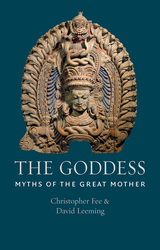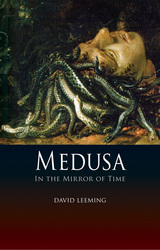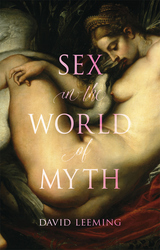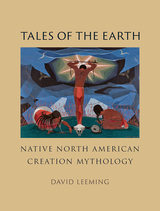4 books about Leeming, David

The Goddess
Myths of the Great Mother
Christopher Fee and David Leeming
Reaktion Books, 2016
For as long as we have sought god, we have found the goddess. Ruling over the imaginations of humankind’s earliest agricultural civilizations, she played a critical spiritual role as a keeper of nature’s fertile powers and an assurance of the next sustaining harvest. In The Goddess, David Leeming and Christopher Fee take us all the way back into prehistory, tracing the goddess across vast spans of time to tell the epic story of the transformation of belief and what it says about who we are.
Leeming and Fee use the goddess to gaze into the lives and souls of the people who worshipped her. They chart the development of traditional Western gender roles through an understanding of the transformation of concepts of the Goddess from her earliest roots in India and Iran to her more familiar faces in Ireland and Iceland. They examine the subordination of the goddess to the god as human civilizations became mobile and began to look upon masculine deities for assurances of survival in movement and battle. And they show how, despite this history, the goddess has remained alive in our spiritual imaginations, in figures such as the Christian Virgin Mother and, in contemporary times, the new-age resurrection of figures such as Gaia.
The Goddess explores this central aspect of ancient spiritual thought as a window into human history and the deepest roots of our beliefs.
Leeming and Fee use the goddess to gaze into the lives and souls of the people who worshipped her. They chart the development of traditional Western gender roles through an understanding of the transformation of concepts of the Goddess from her earliest roots in India and Iran to her more familiar faces in Ireland and Iceland. They examine the subordination of the goddess to the god as human civilizations became mobile and began to look upon masculine deities for assurances of survival in movement and battle. And they show how, despite this history, the goddess has remained alive in our spiritual imaginations, in figures such as the Christian Virgin Mother and, in contemporary times, the new-age resurrection of figures such as Gaia.
The Goddess explores this central aspect of ancient spiritual thought as a window into human history and the deepest roots of our beliefs.
[more]

Medusa
In the Mirror of Time
David Leeming
Reaktion Books, 2013
With her repulsive face and head full of living, venomous snakes, Medusa is petrifying—quite literally, since looking directly at her turned people to stone. Ever since Perseus cut off her head and presented it to Athena, she has been a woman of many forms: a dangerous female monster that had to be destroyed, an erotic power that could annihilate men, and, thanks to Freud, a woman whose hair was a nest of terrifying penises that signaled castration. She has been immortalized by artists from Leonardo da Vinci to Salvador Dalí and was the emblem of the Jacobins after the French Revolution. Today, she’s viewed by feminists as a noble victim of patriarchy and used by Versace in the designer’s logo for men’s underwear, haute couture, and exotic dinnerware. She even gives her name to a sushi roll on a Disney resort menu. Why does Medusa continue to have this power to transfix us?
David Leeming seeks to answer this question in Medusa, a biography of the mythical creature. Searching for the origins of Medusa’s myth in cultures that predate ancient Greece, Leeming explores how and why the mythical figure of the gorgon has become one of the most important and enduring ideas in human history. From an oil painting by Caravaggio to Clash of the Titans and Dungeons and Dragons, he delves into the many depictions of Medusa, ultimately revealing that her story is a cultural dream that continues to change and develop with each new era.
Asking what the evolution of the Medusa myth discloses about our culture and ourselves, this book paints an illuminating portrait of a woman who has never ceased to enthrall.
[more]

Sex in the World of Myth
David Leeming
Reaktion Books, 2018
In Sex in the World of Myth, David Leeming argues that sex is as important in myths as it is in our daily lives. Casting myths as our cultural dreams, Leeming shows that sex is pervasive in all mythologies because it has obsessed and confused us like nothing else. He reveals how sexual myths, like all myths, can have many purposes. The reproductive acts of the ancient Greek goddess Gaia, for instance, may reflect a pre-Olympian matriarchal social system, while tales of the unbridled sexual deeds of the Polynesian Maui, and many others, speak to a natural fascination with the power and mystery of sexual drives. Both a survey of the sex lives of the world’s mythological figures and their deep meaning, Sex in the World of Myth demonstrates that even when such myths are meant to elicit laughter or titillation, the participation in them of sacred heroes and deities means they are in some sense religious—tales offering us partial answers to the nature of existence in general, and of human sexuality in particular.
[more]

Tales of the Earth
Native North American Creation Mythology
David Leeming
Reaktion Books, 2021
A revealing analysis of key themes in Native American origin myths—and their stark contrast with the exceptionalist values of the United States.
Tales of the Earth is a comprehensive yet concise overview of Native American mythologies. After outlining theories of the origins of Native North Americans, David Leeming considers the creation myths of many tribes, emphasizing four commonly occurring figures: the Great Spirit, the trickster, the goddess, and the hero. Leeming suggests that in addition to these figures, Native American mythologies have in common a deep reverence for the earth and for community responsibility as opposed to individualism—tenets that stand in stark contrast to the concepts of exceptionalism and Manifest Destiny that characterize the United States, a nation that was built on ancient tribal land.
Tales of the Earth is a comprehensive yet concise overview of Native American mythologies. After outlining theories of the origins of Native North Americans, David Leeming considers the creation myths of many tribes, emphasizing four commonly occurring figures: the Great Spirit, the trickster, the goddess, and the hero. Leeming suggests that in addition to these figures, Native American mythologies have in common a deep reverence for the earth and for community responsibility as opposed to individualism—tenets that stand in stark contrast to the concepts of exceptionalism and Manifest Destiny that characterize the United States, a nation that was built on ancient tribal land.
[more]
READERS
Browse our collection.
PUBLISHERS
See BiblioVault's publisher services.
STUDENT SERVICES
Files for college accessibility offices.
UChicago Accessibility Resources
home | accessibility | search | about | contact us
BiblioVault ® 2001 - 2024
The University of Chicago Press









